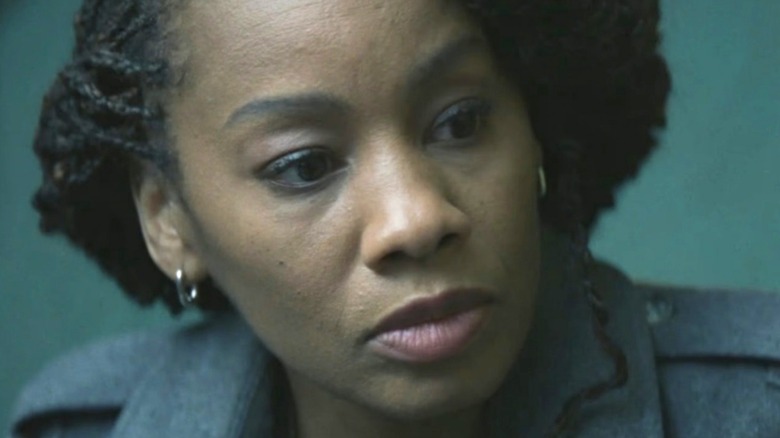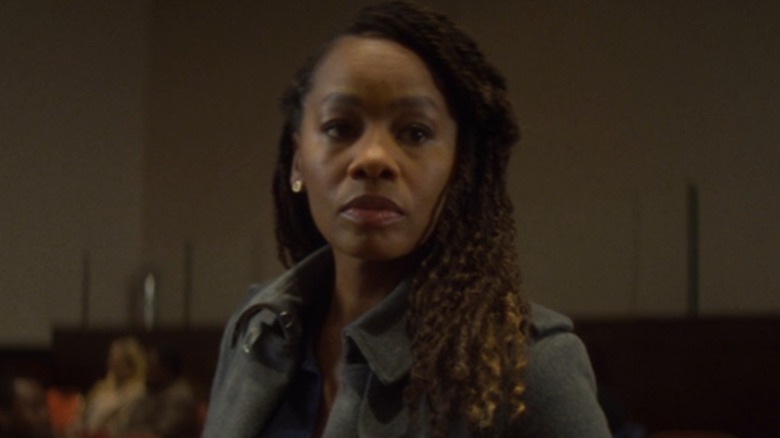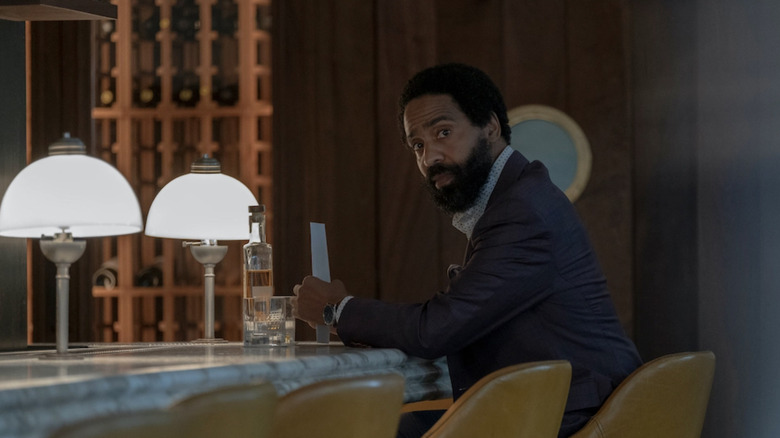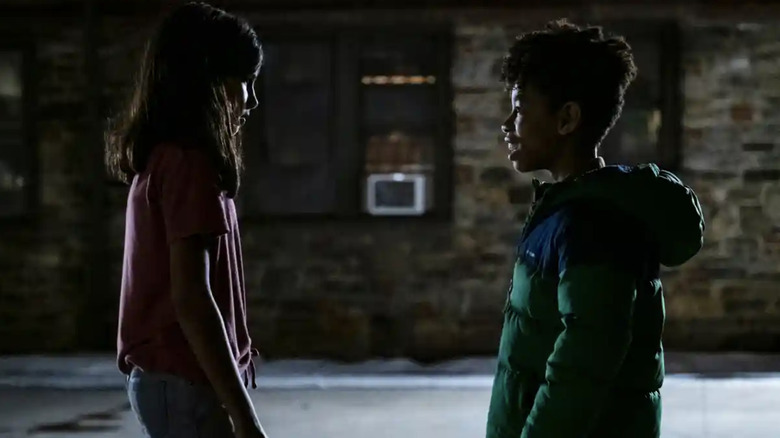Let The Right One In's Anika Noni Rose, Kevin Carroll, And Ian Foreman Discuss The Vampire Genre - Exclusive Interview
No matter what decade it is, the vampire genre never seems to go out of style. John Ajvide Lindqvist's "Let the Right One In" novel was released in 2004, and since then, the book has seen quite a few adaptations. In 2008, a film by the same name was released, and just two years later, Chlöe Grace Moretz starred in an adaptation called "Let Me In." Yet that wasn't the last iteration of this tale of a childlike vampire finding human caretakers that grow old while she stays young forever.
Showtime is giving fans of the vampire genre and the original source material a diverse and well-rounded adaptation of this story, starring Anika Noni Rose as Naomi Cole, Ian Foreman as her onscreen son Isaiah, and Kevin Carroll as restauranteur (and Mark's confidante) Zeke Dawes.
"Let the Right One In" invited Looper to the New York Comic Con press room, where we spoke to Rose, Carroll, and Foreman about adapting the show from the book and movie, the joys of the vampire genre, the metaphors it provides, and working with the cast. Rose and Carroll also touched on their other roles, like "Jingle Jangle," "The Walking Dead," and "Lucifer."
Anika Noni Rose talks Demián Bichir and OG content
[Anika], you've done a significant number of fun, lighthearted pieces — roles like "[The] Princess and the Frog," "Dreamgirls," and "Jingle Jangle." What was that transition like, going to a much darker role in this show? Are there any cast members from those projects you'd like to see on this one?
Anika Noni Rose: I welcome good actors anywhere. If I'm doing a project, I welcome good actors all around. I've done a lot of drama, so it wasn't a difficult move for me to step into that. Even within "Jingle Jangle," my character was dramatic. She was going through something. I miss comedy, but I find that this is interesting to be in a genre piece [while] also bringing true life to the genre piece. So no, I didn't have to do anything extraordinary to be doing this, but I do enjoy it.
Did any of your work on those roles help inspire any choices on this one?
Rose: Not the roles that you mentioned, no.
What has it been like working with Demián [Bichir]?
Rose: [Jokingly] With Demián, he is a horror. Where is he? He's terrible. He only wants green M&Ms.
He's lovely. He's a really charming person. He's a very tenderhearted and caring person. And he's also fun. He looks for the fun. He's very silly, and it is a safe space when you're working with him. You can't say that about everyone, but I'm very grateful to say that that is the case.
Were you a fan of the original book and movie? What do you think [is] from [them], and what do you think [they] do differently?
Rose: I'm a great fan of the original movie. I read the book. I thought it was amazing. We're taking those questions of humanity and where the break in humanity lies and bringing them into what we're doing. It's an exploration of humanity, particularly when you are dealing with monsters. While you're looking at the monster, that in itself is an exploration of humanity. Where do we connect? Where do we depart? Where do we overlap?
Kevin Carroll on genre twists
[Kevin], you seem to be drawn to darker roles. What stands out in this role that's different from roles like "The Walking Dead" and "Lucifer," and are there any costars from those shows that you want to join this cast?
Kevin Carroll: Oh my god. Yes. I can't call names because I would get all kinds of phone calls if people would [get] mad, but I think that as a genre, this is an exciting way to tell stories. These worlds give us the latitude to include a lot of human emotions ... It can hold different genres of storytelling and be set in a world of vampires, or in [the] case of "Walking Dead," the walkers.
It gives us a context to play and expand on storylines. It's a very creative space for writers. What happens is it creates a lot of room for you to play and go all over the map emotionally. I love [this genre] for those reasons. One thing that's different about this is, it's been a long time since I've seen a buddy-buddy connection role come along that was not only about the men accomplishing something but had a real, solid emotional component set in it. I hadn't done anything like this before, so I thought this would be an interesting challenge.
Andrew [Hinderaker]'s a writer, and he's from the theater, so that excited me. Then when I watched the source material, the original movie, I was hooked. I thought the movie was great. It was different. It's ultimately a love story. That was nice.
[This show] has a really great story about recovery [with Frank]. Why do you think that's such an important story to tell in media? A lot of times, people use vampirism as a metaphor for [drug or alcohol use], so would you want [the series] to explore [a] version of that?
Carroll: Sure. In this country, we've had the crack epidemic, dealing with over-the-counter drug addiction. I love the fact that we can use this art, use our art, [and] use our voices to hopefully highlight, inspire, and help people along the way. If we can do that and put it in the context of vampirism, which seems to have so many people drawn to the genre of it, then it creates a great space to maybe talk and heal and help some people that are dealing with this. At the same time, we get the reward of being entertained.
Ian Foreman discusses his character's family dynamics
[Ian], you have some great scenes with Madison [Taylor Baez]. What has it been like working with her, and do you have any favorite moments from set?
Ian Foreman: It's been really fun working with Madison. She's a great actress, really fun. We're very playful on set. One of my favorite moments on set with her is probably during the crying scene. Well, maybe not crying scenes, but maybe more of the emotional scenes because it's pretty cool how we're playing around, telling jokes, and then when it's time to start the scene, we pull it together, and we're all serious.
What about your onscreen mom?
Foreman: My onscreen mom — I love Anika. She has great motherly instincts, so much so that she reminds me of my own mother. The playfulness between [her and me]. She's really supportive. She's a lovely person to be around.
Does she ever give you any advice about life or acting?
Foreman: Yes. I remember a time — this was after we finished shooting — I was trying to [make] a decision between whether I want[ed] to do homeschool or regular school. And Anika told me to not let anyone [make] my decision for me. She has given me a lot of little quotes like that to me to help me through life.
You have a pretty fractured onscreen relationship with your dad. Why do you think that's such an important topic to tackle on TV?
Foreman: I think that it's an important lesson because [if you] look at this on the bright side, it shows how single mothers can do anything that they put their mind[s] to and that all you need is to put in the hard work and God.
What has been the coolest part about being in this vampire universe? Do you hope that one day your character turns into a vampire?
Foreman: It would be cool if I was a vampire, but one of the coolest things is working with everyone on set because everyone's super cool, super fun. We had a really good time on set, and that was the coolest part.
New episodes of "Let the Right One In" air Sundays on Showtime.
This interview has been edited for clarity.



